Under the guise of a Puerto Rican, Ramón Labañino, one of the Cuban Five, disrupted his future as an economist. Escambray tells his story as a state security agent
It is Monday, December 15th, 2014. In prison, before going to sleep, Ramón Labañino Salazar browses the photo album, sort of window through which he escapes when he wants to meet his loved ones, despite there is an abyss between Ashland, Kentucky, USA, and Havana, Cuba.
—Leave the clock in the cabinet, put your tennis shoes on, and come with me, he’s urged by the guard.
First they go to the wardrobe, and then somewhere else for the chains.
— We have to get this person to the nearest airport and transfer his properties.
Ramón hears the words very clearly and starts to think that something good is about to happen. Handcuffed, he climbs into a van.
On arriving at the airport, someone says: “Hurry up, the other one is coming behind”. A prison hospital in North Carolina was the destination.
The scenes occur as in a Hollywood-style movie, with the substantial difference that is a true story, in which Antonio Guerrero and Gerardo Hernández are also starring. None of them had the slightest idea about the secret round of official talks between Cuban and USA officials started in 2013.
Ramón’s premonition is about to be consummated, although he gets no explanation whatsoever from the guards who take him from one place to another. Since his arrival at the hospital, he’s only got eyes for Gerardo and Antonio; nevertheless, there’s no sign of them. Around eight in the morning, December 16, a guard tells him:
—You go to the visiting area.
He’s quickly taken down a corridor, and suddenly he meets face to face with his brothers. He then forgets about his knee for long injured, and runs to them. They melt into each other’s arms. Later on they would know that, at 8:10 a.m., the next day, they will have warm and venerable Cuba under their feet.
—I —
For the second time, I’m back in the headquarters of the Cuban Institute of Friendship with the Peoples, in Havana. On this occasion I’m interviewing another hero: Ramón. It was René González the first time. Elizabeth Palmeiro Casado is also present. She’s very attentive to the words of her husband, who settled in 1992 Florida as agent of the Cuban Security under the pseudonym of Oso (Bear).
“My family was completely unaware of what I was doing. Since I’m an economist, I told them I would be the manager of a certain Spanish firm that would bring goods to Cuba because of the blockade”, Ramón points out.
Which route did you follow to get to the United States?
“I travelled to several countries, and finally I went to Mexico. Once there I told to myself: I made it. For us (agents), getting into another country is the most difficult moment because you do it under false identity. It’s all about the training. If you can do it, it means you were properly trained”.
From that moment on you were Puerto Rican Luis Medina. Could it be said that you knew San Juan more than Havana?
“I had the necessary to play that character. I had travelled to Puerto Rico. In my legend aspects like the colour of the house where I used to live, the schools I attended, and the bus stop in front were included”.
Ramón settled down in Tampa. He stayed in a hotel first, but he immediately looked for a cheaper place.
“I chose the southern part of the city, which was a low-income area. I started to walk block by block, until I found a house to rent. It was owned by a very humble woman of Haitian origin. I introduced myself as a university student. Fortunately, she didn’t request any document”.
What did you do for a living?
“I delivered newspapers to homes, and sold leather shoes by catalogue. Working at home gave us a lot of autonomy and didn’t leave many documentary traces. In 1996, I was ordered to move to Miami. There I drove a van in which I distributed goods, medicines…to several pharmacies. This was the most permanent of my jobs”.
When did you first meet Gerardo, head of the network in the United States?
“I would like to make a clarification. In fact, Gerardo was not the head of the whole network; he led one group, and I led another. I believe that the prosecutor’s office, in an effort to come across with Gerardo, put him as head of the network. He was a victim of an enormous snare. They wanted to find a scapegoat for the planes issue (on February 24th, 1996, Cuba knocked down two aircrafts of the Hermanos al Rescate terrorist group, for the violation of the Cuban airspace).
“After being already established in Miami, I was given the instruction to see him. The first meeting was a very formal one between two officers. We met behind a library. It was a brief encounter”.
Among your missions, you had to monitor terrorist Orlando Bosch, one of the masterminds of the Barbados crime.
“It’s hard to track terrorists; they have tremendous debts to the people. It was very difficult for me to be so close to Orlando Bosch knowing he had caused so much damage. One of my missions was to follow him when he went to Tampa, especially to Ybor City. I did the same with people of the Cuban American National Foundation. It was my job to make a survey of all that area and tried to place an agent near them so as to search for information about their plans to attack Cuba. We went to the US to prevent them from placing bombs here, and even there. We didn’t go to the USA looking for the secret of the atomic bomb. Cuba has the right to defend itself”.
What examples could you mention of the terrorist actions you prevented?
“Our job involves many men and women. The Five represent many other people. We detected the preparation of a rocket which was to be fired to a plane on which Fidel was travelling; and an explosive pen intended to explode in the presence of the Commander. Another time, we identified people at the airport trying to bring explosives in a bottle of shampoo into the country, to blow electric power plants”.
“For us, the most gratifying thing is to know that what we did was useful. None of the Five was looking for publicity. Our success would have been to remain anonymous for life”.
Due to the unawareness of your relatives about your real mission, and your constant absence from home, your family came to question you. What happened that day at the tomb of your mother?
“My mother died three months before I was discovered, without knowing about my mission. I also received complaints from her. That day, in front of her tomb, my father said to me: ‘For how long will this situation still go on? You’ve got three daughters and a wife…’. Look Dad, to be honest, this will last until I will be of no use for my job, die or get caught”.
— II —
On September 12, 1998, Ramón Labañino was supposed to follow his everyday routine. But around 5:30 a.m., FBI agents broke into his apartment and took him to their General Headquarters, in Miami. There, he was underwent a “persuasion” interview to make him betray; and then he was taken to the Federal Detention Center. Nine other Cuban agents had been also discovered, and were also taken to the Federal Court on September 14.
But five of the group betrayed. How did you know about it?
“Before entering the Court, we were held in a sort of waiting cell. There we realized that some of the agents lacked the courage. Later on, the lawyers warned us that some in the group were co-operating. The impact of the disloyalty was huge, indeed”.
(…)
How much uncertainty you felt knowing that you would be defended by a US attorney?
“My first lawyer, whose name I will not mention, did not satisfy me; I did not like the way he defended me when presenting the first statements on requesting my bail. He was a little ambiguous. I had a conversation with him and asked him if he was willing to be courageous enough. I told him I needed someone capable of demonstrating the truth. We were supposed to denounce terrorists, the people who controlled that city. He gradually withdrew from the case.
“William Norris was the next attorney in charge. Since the very first moment I saw him, he made a good impression on me. So, I told him I was glad he understood our secret job. I promised him I would tell him what I could really say, that I would never tell a lie. I asked him to ignore the media. Can you imagine how could the media refer to the fact that five men with no money in their pocket could destroy democracy and national security in the USA? The lawyers really fought for us”.
The hearing of the trial with the presentation of arguments by the prosecution and defense actually started on December 6, 2000. It was only within that context that the real names of Manuel Viramontes (Gerardo Hernández), Rubén Campa (Fernando González), and Luis Medina (Ramón Labañino) were revealed. Not even the FBI could disclose them.
Some minutes before Norris presented his allegation, Ramón explained to him: “Yes I am an unregistered foreign agent, and I do have false documents, but I’m not a spy. I didn’t come here looking for military secrets”.
Ramón got a life sentence plus 18 years of imprisonment, which he served in the prisons of Beaumont, in Texas, and McCreary, in Kentucky. He was re-sentenced to 30 years imprisonment in 2009, and was transferred first to Jesup (Georgia), and then to Ashland (Kentucky).
How many times did you have to use warnings to demand respect for yourselves?
“We were all respected in prison, but there were moments in which others tried to be disrespectful. One had to deal with criminals and if you didn’t respond according to the circumstances, they could later on abuse you. I always made this warning: we are friendly, but don’t mess up with us because we immediately take out Antonio Maceo’s machete, and I said the phrase graphically.
“Many of the problems in jail are because people don’t know how to talk. For example, in order to watch the television, you have to make a mark on the floor for your chair, and in case you move it just a little out your area, you might even get stabbed. I was always taken as leader of the Cubans, not only because I am big and strong, but also because of the way I talked, the way I behaved in front of others.
“I’m writing a diary about the daily life in the prison. I did not want my wife and daughters to read it; it has scenes of murder, drugs, prostitution, everything you see in a US jail.
Nevertheless, you said that you left another family there.
“In prison you meet good people, too. Life in America is very difficult; if you don’t have the money, you die of hunger. We met people who felt for Cuba and are capable of defending the Revolution. You live with them and become friends with them. Nowadays they phone me, or write me by mail. I’ve tried to see their relatives as I promised to do”.
Why did you resort to poetry?
“Poetry was a way to fight loneliness, it helped me survived. I wrote it from the bottom of my heart, like the poems I dedicated to my mother. I was in debt with her. In the poems Carta a una madre ausente (Letter to a missing mother) and Deuda (Debt) I told her things I had left unsaid”.
Another poet, Silvio Rodríguez, wrote the song El dulce abismo (The sweet abyss), which symbolizes the love story of the Cuban Five. Amada, (…) yo parto, tú guardarás el huerto (My sweetheart, (…) I depart, you will keep the garden), reads one of song’s lines. How did Ramón find his garden? You called your wife a heroine, was it a courtesy to her?
“My garden was beautiful. I found a loving family. I get tired of saying that Eli (Elizabeth) is the heroine. Just imagine her, all alone, raising two girls during the special period years, when there was no food or medicine. Laurita is studying the final year of International Relations, and Lisbeth’s just started to study psychology. They couldn’t be better. Eli knew how to inculcate in my children that I had not abandoned them.
“And on top of that, there was the international campaign. Like the rest of the wives, Eli was not only faithful like Penelope. They didn’t sit down to wait, they were the first to travel all around Cuba; and then, they met with presidents from other countries, with parliamentarians. That’s my wife!. Look how she has grown up. That spiritual, human growth is only present in heroines like her. We are not the heroes, they are”.
You declared yourself as the most optimistic of the Cuban Five.
“I am optimistic by nature. Optimism helps to live and to overcome difficulties, and it has to do with the richness inside us, with our memories. For example, I always dreamed nice. While in jail, I dreamed I was free; it was a very clear dream, and when I woke up I said to myself: it’s not possible that I’m in prison, I was in Cuba already. When you’re optimistic, you say, today I am not free, but it will be tomorrow. When the next morning comes, another day is already gone.
“If you get into the negativity of jail, you destroy yourself. Optimism seems anachronistic in these circumstances. I saw depressed people who hanged themselves. I met a man who had killed 12 of his family members. So I created a concept: I survive prison, but live outside it. I lived the daily life of my family. 90 percent of my mind was for that; the other 10, for the internal issues of the prison.
“In order to survive, I also took refuge in sports. I exercised, did weight training, played chess, and also handball, with which I got my knee injured. I went to the doctor, but medical care in prison is terrible. There you’re looked after when you’re already about to die”.
Is your knee any better?
“It doesn’t hurt, and I feel much better. After I climbed the Turquino Peak, I feel more agile. The doctor said that if severe pain is back, then I need to have a surgery. ”
When we say white seagulls, what do you remember?
“In the fall, the prison in Beaumont, Texas, got full of white seagulls; it was something poetic. Imagine a violent prison, where everything is wired, with very high walls, and people hating each other, and suddenly you see this image. It’s quite a symbolism. Then you think that despite all the excesses, there is peace, and there is love. For me, white seagulls were hope”.
 Escambray ENGLISH EDITION
Escambray ENGLISH EDITION
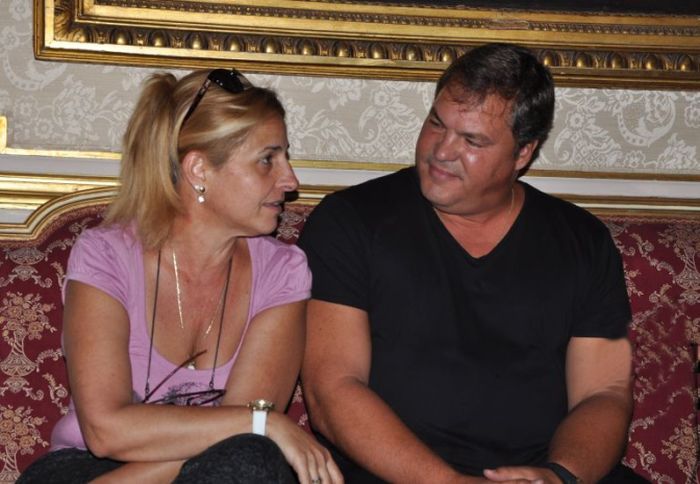
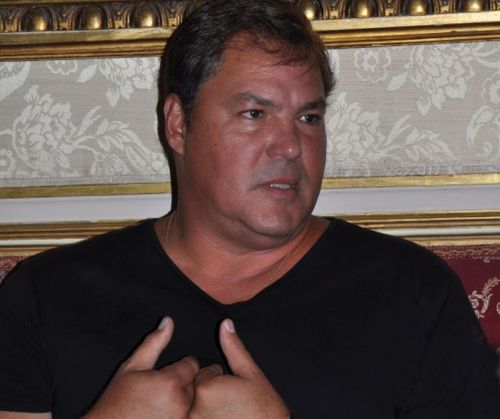
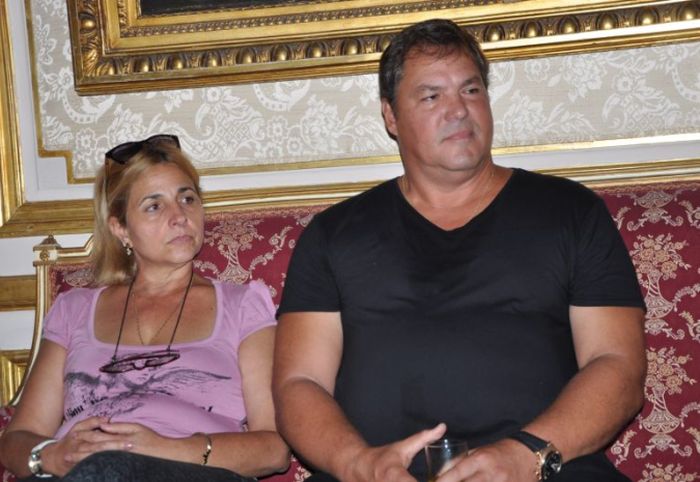
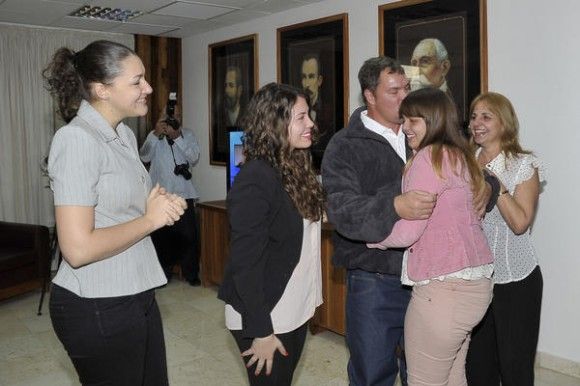
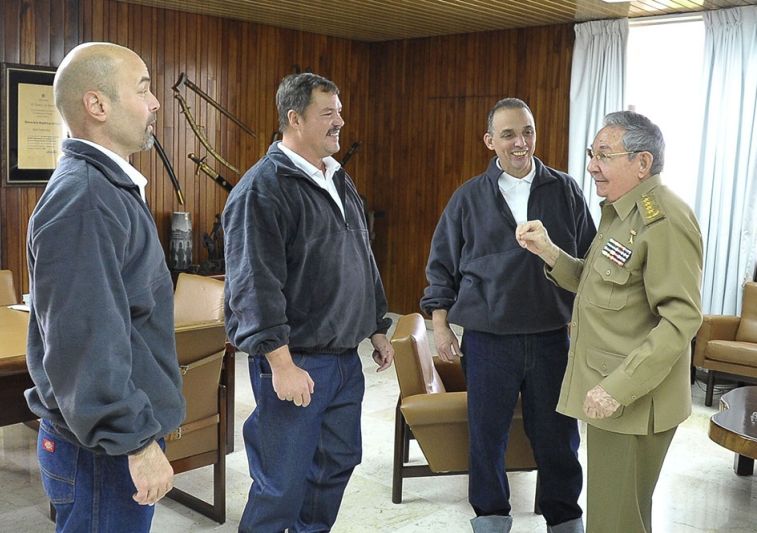
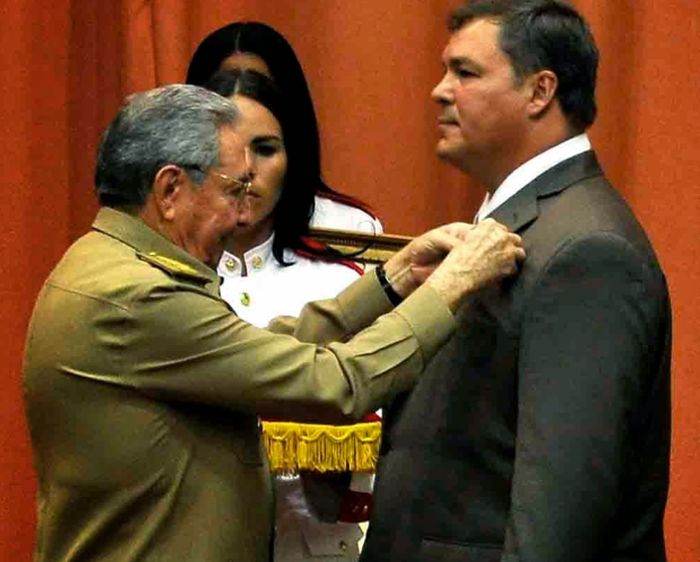





Escambray reserves the right to publish comments.